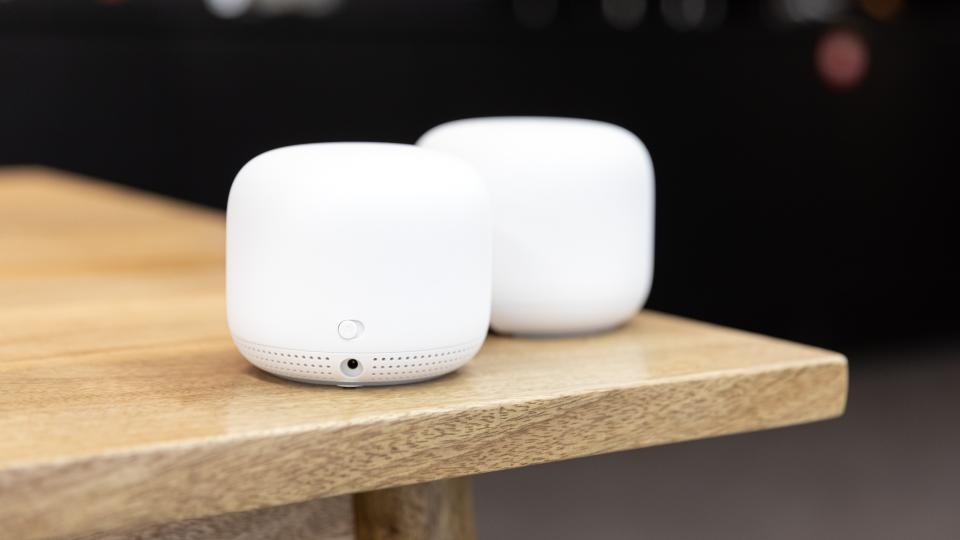
Boost your home Wi-Fi speeds and kill dead spots with our pick of the best mesh Wi-Fi routers
Fed up with flaky Wi-Fi? Choose one of our best mesh WiFi systems and you’ll be able to enjoy a superfast connection in all corners of your home. These clever extensible kits cover a huge area, and since you can locate the nodes wherever you want – and even add extras – you can be certain of getting a strong signal where it’s needed. Performance is top-notch, too, leaving traditional wireless repeaters and powerline extenders in the dust.
Here’s our guide to the best whole-home mesh Wi-Fi kits on the market – the ones that provided the best range and the fastest coverage in our extensive testing. We’ve included a comprehensive buyer’s guide, too, so you’ll know what features to look out for. Read on to find the mesh networking system that will wash away your wireless blues.
Best mesh Wi-fi router: At a glance
If you don’t want to go trawling through the reviews or the guide, however, we’ve put together a quick list of our favourite systems right here so you can click straight through and buy them:
- BT Whole Home Wi-Fi: Best overall – £150 from Amazon (2 pack)
- BT Mini Whole Home Wi-Fi: Cheapest 3 unit system – £73 from Amazon (3 pack)
- Asus ZenWiFi AC: Fastest – £280 from Amazon
- Netgear Orbi WiFi 6: Best for Wi-Fi 6 – £710 from Amazon (2 pack)
- Linksys Velop: Most fully featured – £500 from Amazon (3 pack)
How to buy the best mesh Wi-Fi router for you
What type of mesh Wi-Fi router should I buy?
Mesh systems work on the same basic principle as wireless repeaters, but they use a private radio channel – the “backhaul” – to talk to each other. This means less contention, and better performance, on your main wireless network.
As the name suggests, mesh systems are also designed to support multiple nodes, which can be deployed in a “daisy-chain” configuration, rather than each one needing a direct connection to the router. This makes it easy to extend a wireless connection over a huge area by simply placing nodes at regular intervals around your home or workplace.
Will a mesh system work with my router?
Most mesh systems are designed to replace your existing router. If you’re currently using a combined modem router, you can normally switch this into modem mode, allowing the mesh system to handle router duties.
Alternatively, you can switch your mesh kit into bridge mode, and connect it to your existing router via an Ethernet cable. Just be warned that this isn’t normally the default installation procedure, so you may need to do a bit of research when getting set up. And make sure you connect your first mesh node to a Gigabit Ethernet port on your router; a slower 100Mbits/sec port will seriously bottleneck the speed of your wireless clients.
How many nodes do I need?
Most kits promise more than 400m² of wireless coverage with just two or three nodes. In practice, the coverage you actually get will depend on mundane things such as fridges and walls – but the best kits are more than capable of filling a moderately sized home with fast Wi-Fi, even with only two nodes. If you think you might want to invest in additional nodes, check your options before you buy, as not all manufacturers sell individual units.
Do I need the fastest mesh Wi-Fi system out there?
If you’re chiefly interested in extending your internet connection around your home, there’s no need to invest in the fastest, most expensive kit you can find. Almost any mesh system will be fast enough to share the full bandwidth of a typical 40Mbits/sec internet connection around your home.
That said, it makes sense to pick a kit that won’t hold you back if you upgrade to faster broadband in a couple of years. Choosing a faster system also means traffic will be able to travel around your local network faster, so (for example) you’ll be able to copy files to and from a NAS appliance more quickly; that’s how we tested the mesh systems below to get a true picture of their maximum transfer speeds.
Are mesh Wi-Fi systems easy to set up and administer?
Most mesh Wi-Fi kits come with a smartphone app – for both Android and iOS – that walks you through the setup process. You can then continue to use the smartphone app to monitor and manage your mesh system. A web portal is sometimes available too, but it may not expose all of the available settings.
Note that, while most mesh kits do basic router duties, they’re often not as configurable as a “real” router. You may not be able to change the default address range, and not all models let you join clients to the network via WPS.
What features should I look for?
Most mesh systems can present a wireless guest network alongside your normal domestic network. Devices connecting to this will be able to connect to the internet, but can’t talk to other devices on your home network. This means visitors can’t snoop through your shared folders or unwittingly bring malware onto your home network.
Some systems also offer basic parental controls: for example, you might be able to block internet access for specific devices between certain hours. They don’t normally have the ability to filter out unsuitable content, though; if you want to keep a detailed eye on what your kids get up to online, you’ll probably need a software-based system.
A final feature worth looking out for is Alexa integration, which allows you to trigger various tasks by issuing a voice command to an Amazon Echo device. For example, you might be able to activate or deactivate the guest network, activate WPS or have Alexa read out your wireless passphrase. It might seem gimmicky, but it’s a nice bonus to have.
The best mesh Wi-Fi routers you can buy
1. BT Whole Home Wi-Fi: Best-value mesh extender system
Price: £150 (twin pack) | Buy now from Amazon

BT’s Whole Home Wi-Fi now comes in a few different flavours: the original, which we have here; the Premium version, which is faster but a lot pricier and the Mini (see below), which is the cheapest but not as fast as the original. The original system is getting on a bit these days but it’s still the best value mesh W-Fi system you can buy.
The system acts as a wireless extender system for your existing router, connecting via a simple Gigabit Ethernet cable. This means it doesn’t mess with your network settings, and there’s very little to configure – although the system does offer a guest network facility and simple group-based parental controls. The nodes look a bit odd, standing upright like mini-satellite dishes, but their small footprint means it’s easy to find suitable places for them around the home.
BT claims it will cover an area of 420m², which is on the low side for a three-node network – but it certainly eradicated the not-spots in my home. No matter where I wandered, I got a rock-solid 5GHz connection, with download speeds never dipping below 11.8MB/sec.
The extender-only approach does mean that you’re stuck with your old router: if you were planning to replace it, a different mesh system might make sense. On the upside, it keeps the price almost irresistibly low: if you just want to banish those irritating dead spots with minimal upheaval, it’s an absolute bargain.
Read our full review of BT Whole Home Wi-Fi
Key specs – Nodes (as reviewed): 3; Claimed coverage: 420m²; Maximum nodes supported: 6; 2.4GHz speed: 800Mbits/sec; 5GHz speed: 867Mbits/sec (client) + 867Mbits/sec (backhaul); MIMO channels: 4×4 on each band; Ethernet ports: 1 x GbE per node; Guest network: Yes; Parental controls: Yes; Works with Alexa: No; IPv6: Yes; Custom IP range: N/A; Client IP reservation: N/A; Port forwarding: N/A; 2.4GHz/5GHz band splitting: No; Warranty: 2yr

BT Whole Home Wi-Fi, Pack of 2 Discs, Mesh Wi-Fi for seamless, speedy (AC2600) connection, Wi-Fi everywhere in small to medium homes, App for complete control and 3 year warranty
£124.99 Buy now 


BT Premium Whole Home Wi-Fi, Pack of 3 Discs, Mesh Wi-Fi for Seamless, Speedy (AX3700) Connection, Wi-Fi Everywhere In medium to large Homes, App for Complete Control and 3 Year Warranty
£269.99 Buy now 

2. BT Mini Whole Home WiFi: The best cheap mesh network
Price: £72 | Buy now from Amazon
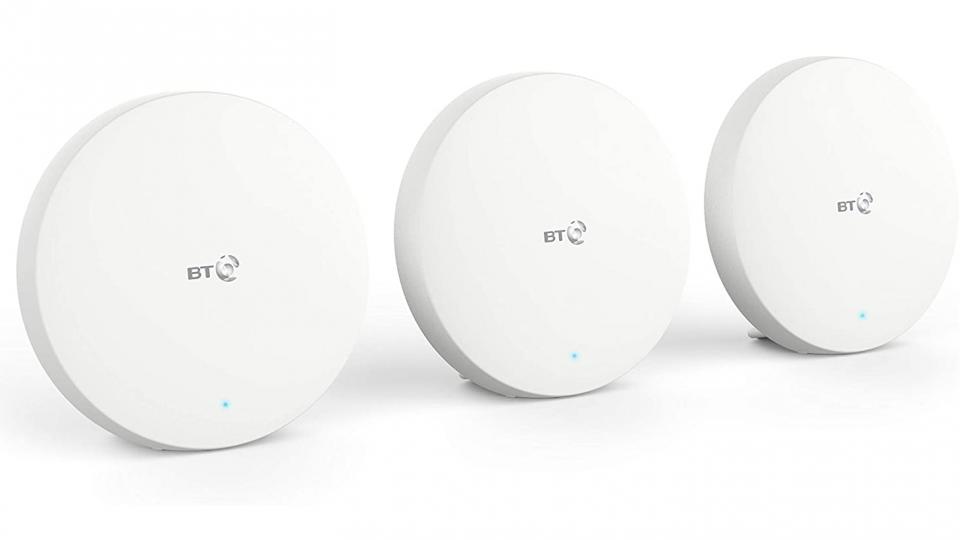
There was a time when mesh Wi-Fi router systems commanded a premium, no matter the level of performance but prices have fallen dramatically in recent times and there’s none more reasonably priced than the BT Mini Whole Home WiFi. It’s the cheapest three-node system we’ve ever reviewed.
The low price does mean you have to make some compromises. It’s only a dual-band system, which restricts performance compared with the faster, tri-band BT Whole Home system. The Mini’s total rated bandwidth of 1,200Mbits/sec is lower, too, and this all goes together to produce performance figures that are roughly half that of the original system.
However, overall performance is still more impressive than the previous cheapest system we’ve seen – the Tenda Nova MW3. It’s also a system that’s extremely simple to install and use as it aims to extend, rather than replace, your existing wireless router.
Key specs – Nodes (as reviewed): 3; Claimed coverage: Not stated; Maximum nodes supported: 6; 2.4GHz speed: 300Mbits/sec; 5GHz speed: 867Mbits/sec (client and backhaul); MIMO channels: 4×4; Ethernet ports: 1 x GbE per node; Guest network: Yes; Parental controls: No; Works with Alexa: No; IPv6: Yes; Custom IP range: N/A; Client IP reservation: N/A; Port forwarding: N/A; 2.4GHz/5GHz band splitting: No; Warranty: 2yr

BT Mini Whole Home Wi-Fi, Pack of 3 Discs, Mesh Wi-Fi for Seamless, Speedy (AC1200) Connection, Wi-Fi Everywhere In medium to large Homes, App for Complete Control and 3 Year Warranty
£116.72 Buy now 

3. Tenda Nova MW6: Another great-value mesh router
Price: £160 (triple pack) | Buy now from Amazon

Tenda’s little white cubes are undeniably tasteful, and they’re compact enough that you can easily distribute the three of them about your home. The downside is a comparatively slow backhaul speed, which means download speeds can’t match the market leaders – but I still reliably got upwards of 10MB/sec all over my home.
The feature set isn’t as generous as other mesh systems, either: there’s no band-splitting option, nor support for IPv6. You do, however, get a simple guest network feature, which you can activate for four hours, eight hours or permanently, and a group-based parental control function that lets you limit internet access to certain times of day for specified clients. There’s Alexa support too, so you can use voice commands to check the router status and adjust various settings.
What really sets the Tenda Nova MW6 apart is its low price. True, the BT Whole Home kit costs a similar amount, but it only functions as an extender, whereas the MW6 is a fully standalone system. That makes it a terrifically cost-effective option if you’re looking to replace an underperforming router and extend your Wi-Fi coverage at the same time.
Key specs – Nodes (as reviewed): 3; Claimed coverage: 560m²; Maximum nodes supported: 10; 2.4GHz speed: 300Mbits/sec; 5GHz speed: 867Mbits/sec (combined client & backhaul); MIMO channels: 2×2 on each band; Ethernet ports: 2 x GbE per node; Guest network: Yes; Parental controls: Yes; Works with Alexa: Yes; IPv6: No; Custom IP range: Partial; Client IP reservation: Via port forwarding; Port forwarding: Yes; 2.4GHz/5GHz band splitting: No; Warranty: 3yr
4. Asus ZenWiFi AC: Supreme speed and packed with features
Price: £280 (twin pack) | Buy now from Amazon
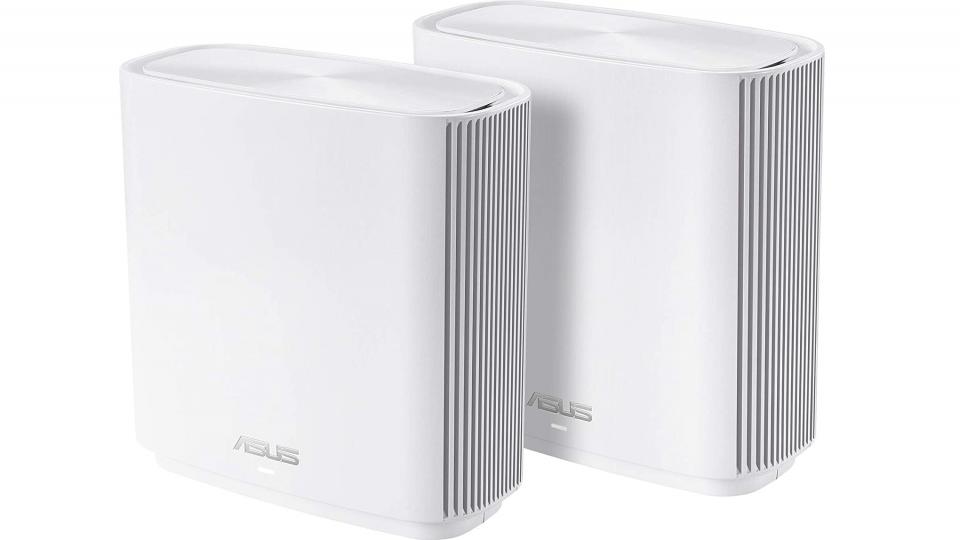
The Asus ZenWifi AC might be pricey but it’s the fastest 802.11ac mesh Wi-Fi system around right now, topping a huge 30MB/sec download speed in every location we tested in. That’s thanks in the main to its tri-band setup, which utilises a dedicated 5GHz backhaul channel to ensure transfer speeds between nodes are as high as possible.
And while most mesh systems aim to keep the complexity down, the ZenWiFi gives users access to the same advanced settings as you get on the company’s high-end domestic routers. Each node has four Gigabit Ethernet ports on the rear and a USB socket for sharing printers, storage or 4G adapters. The system has built-in PPTP, OpenVPN and IPSec servers so you can access your home network securely from remote locations, and you get three independent guest networks plus a network-level firewall that lets you block individual ports, URLs and web pages containing keywords.
It is quite pricey for a two-box system but the performance you get is well worth the extra spend. This is mesh Wi-Fi done brilliantly.
Key specs – Nodes (as reviewed): 2; Claimed coverage: 400m²; 2.4GHz speed: 400Mbits/sec; 5GHz speed: 867Mbits/sec (client) + 1733Mbits/sec (backhaul); MIMO channels: 2×2 on client bands, 4×4 on backhaul; Ethernet ports: 4 x GbE per node; Guest network: Yes; Parental controls: Yes; Works with Alexa: Yes; IPv6: Yes; Custom IP range: Yes; Client IP reservation: Yes; Port forwarding: Yes; 2.4GHz/5GHz band splitting: Yes; Warranty: 3yr

ASUS ZenWiFi AC Tri-Band Whole-Home Mesh WiFi System(CT8), Coverage Up to 400 sq m or 4320 sq ft/4+ Rooms, 3 Gbps WiFi, Life-Time Free Network Security and Parental Controls, 4X Gigabit Ports, 3 SSIDs
£279.99 Buy now 

5. Zyxel Multy X: Speedy performance at a reasonable price
Price: £250 (twin pack) | Buy now from Amazon

Zyxel’s bulging Multy X modules aren’t exactly beautiful – and with a sizeable footprint of 236 x 178mm, they’re bulky. But their size allows them to pack in multiple large antennae, allowing them to communicate faster, and over longer distances, than most other mesh systems. Even when positioned at opposite extremities of my home, they were able to maintain a strong, speedy connection – which translated to excellent Wi-Fi performance, with a minimum of 14MB/sec downstream all around the house. Wired clients are well served too, as each node has a generous four Gigabit Ethernet ports.
As a bonus, the Multy X works with Alexa, so if you have an Amazon Echo device you can verbally instruct it to disable the guest network, test your internet speed or temporarily suspend internet access. Our only caveat is that the Multy X doesn’t currently operate as a true mesh network – all nodes talk directly to the router. A forthcoming firmware update promises to add daisy-chaining, though, so you can extend the system’s range even further by buying extra nodes.
Read our full review of the Multy X
Key specs – Nodes (as reviewed): 2; Claimed coverage: 460m²; Maximum nodes supported: 3; 2.4GHz speed: 400Mbits/sec; 5GHz speed: 867Mbits/sec (client) + 1733Mbits/sec (backhaul); MIMO channels: 2×2 on client bands, 4×4 on backhaul; Ethernet ports: 4 x GbE per node; Guest network: Yes; Parental controls: Yes; Works with Alexa: Yes; IPv6: Yes; Custom IP range: No; Client IP reservation: Yes; Port forwarding: Yes; 2.4GHz/5GHz band splitting: Yes; Warranty: 2yr
![Image of ZyXEL Multy X Tri-Band AC3000 Whole Home Wi-Fi Mesh System. Router and Satellite - Pack of 2 [WSQ50] Image of ZyXEL Multy X Tri-Band AC3000 Whole Home Wi-Fi Mesh System. Router and Satellite - Pack of 2 [WSQ50]](https://techgit.net/wp-content/uploads/2020/09/41-Zz2h3ybL._SL160_.jpg)
ZyXEL Multy X Tri-Band AC3000 Whole Home Wi-Fi Mesh System. Router and Satellite – Pack of 2 [WSQ50]
£249.99 Buy now 

6. TP-Link X60: Best value Wi-Fi 6 mesh router
Price: £420 | Buy now from Overclockers
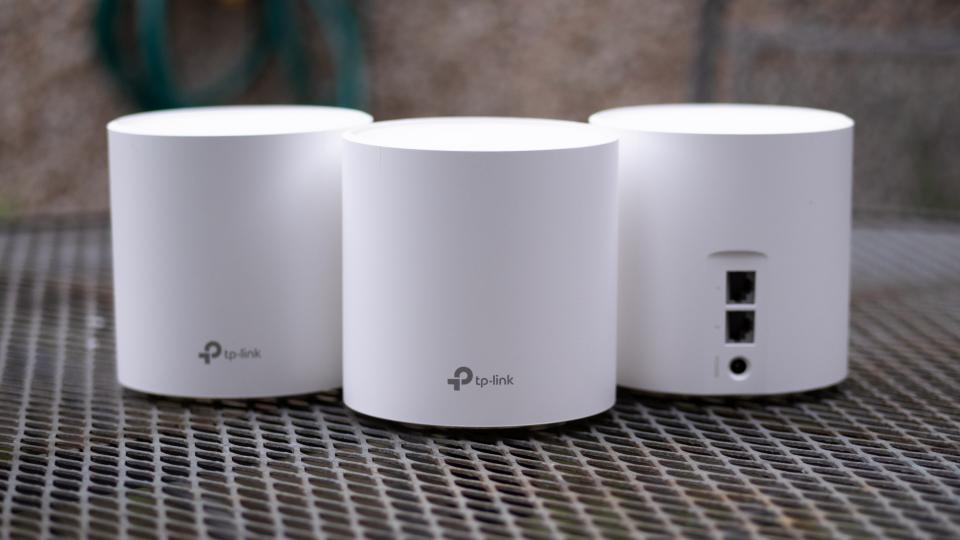
Wi-Fi 6 is the latest, greatest wireless technology promising faster, more stable connections for many more devices than the older 802.11ac standard, but mesh systems based on the tech have as yet been thin on the ground. Of the few that we have tested, the TP-Link X60 is the best value so far, costing around £420 for a three-node pack.
The system is rated for a massive 650m² of coverage and performance is very good, beating the BT Whole Home Wi-Fi system for overall speed and edging in front of even the far more expensive Orbi WiFi 6 for close up speeds. It’s a little less impressive at medium and long-range but still very fast overall and performed consistently in all of our tests. Perhaps more impressively, it comes packed with useful features, including built-in antivirus protection for your whole home, intrusion protection, a malicious content filter and category-based web filtering with age-based presets.
It may be expensive, then, but the TP-Link Deco X60 delivers the most coverage we’ve seen from any mesh system to date and combines that with plenty of features and solid performance as well.
Key specs – Nodes (as reviewed): 3; Claimed coverage: 650m²; 2.4GHz speed: 574Mbits/sec; 5GHz speed: 2,402Mbits/sec (client) no backhaul; MIMO channels: 2×2 on client bands; Ethernet ports: 2 x GbE per node; Guest network: Yes; Parental controls: Yes; IPv6: Yes; Custom IP range: Yes; Client IP reservation: Yes; Port forwarding: Yes; Warranty: 3yr
7. Netgear Orbi WiFi 6: Fastest next-gen mesh router
Price: £710 (twin pack) | Buy now from Amazon
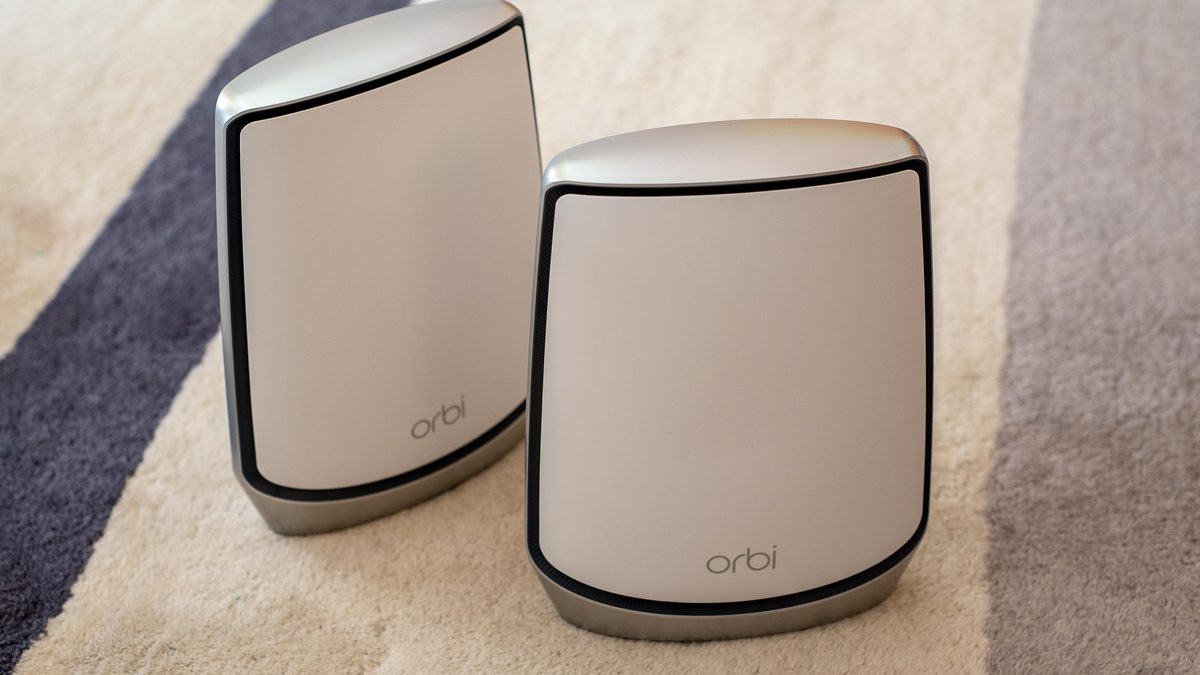
Netgear’s Orbi WiFi 6 is the first mesh system we’ve seen that supports the new 802.11ax standard. That means that, if you connect from a compatible device, it can deliver much faster downloads than any other system on this page – typically in excess of 40MB/sec. Needless to say, the Orbi units work with older clients as well, and even then they still manage to outperform the competition, thanks to a dedicated ultra-fast backhaul connection.
The catch is the cost. At £749 for a two-node pack the Orbi WiFi 6 is vastly more expensive than any regular 802.11ac mesh system. It also costs a lot more than a regular 802.11ax router, which might be enough to deliver the performance and coverage you’re looking for. But if only a mesh system will do, the Orbi WiFi 6 is hands down the fastest money can buy.
Read our full review of the Netgear Orbi WiFi 6
Key specs – Nodes (as reviewed): 2; Claimed coverage: 465m²; Maximum nodes supported: Not stated; 2.4GHz speed: 1,200Mbits/sec; 5GHz speed: 1,200Mbits/sec (client) + 1,200Mbits/sec (backhaul); MIMO channels: 4×4 on each band; Ethernet ports: 4 x GbE per node; Guest network: Yes; Parental controls: No; Works with Alexa: No; IPv6: Yes; Custom IP range: Yes; Client IP reservation: Yes; Port forwarding: Yes; 2.4GHz/5GHz band splitting: No; Warranty: 1yr

NETGEAR Orbi Whole Home Tri-Band Mesh WiFi 6 System (RBK852) – Router with 1 Satellite Extender, Coverage up to 5,000 sq. ft. and 60+ Devices, 11AX Mesh AX6000 WiFi (Up to 6Gbps)
£705.98 Buy now 

8. Linksys Velop: Most fully featured mesh router
Price: £500 (triple pack) | Buy now from Amazon

The Velop is an upmarket mesh system, with advanced features such as port forwarding and port range triggering. Alexa integration means that Amazon Echo owners can also turn the guest network on and off, and perform a few other tasks, with a voice command.
Linksys claims its three nodes offer a large coverage area of 560m², and setting up a daisy-chain configuration is easy. In my own home, I did see some drop-off in transfer rates towards the rear of the house, but things never dipped below 11MB/sec – so it’s more than capable of distributing the full speed of your internet connection all around a moderately sized dwelling. What’s more, you can easily split the radio bands into separate SSIDs to ensure that compatible devices always connect to the faster 5GHz band.
The Velop is a comparatively expensive system, but the three nodes give you flexibility when it comes to positioning the nodes, and few other mesh systems can match it for features.
Read our full review of the Linksys Velop
Key specs – Nodes (as reviewed): 3; Claimed coverage: 560m²; Maximum nodes supported: 6; 2.4GHz speed: 400Mbits/sec; 5GHz speed: 867Mbits/sec (client) + 867Mbits/sec (backhaul); MIMO channels: Not stated; Ethernet ports: 2 x GbE per node; Guest network: Yes; Parental controls: Yes; Works with Alexa: Yes; IPv6: Yes; Custom IP range: No; Client IP reservation: Yes; Port forwarding: Yes; 2.4GHz/5GHz band splitting: Yes; Warranty: 3yr

Linksys WHW0303 Velop Tri-Band Whole Home Mesh Wi-Fi System (AC6600 Wi-Fi Router/Extender for Seamless Coverage, Parental Controls, Compatible with Alexa, Covers up to 6000 sq ft, White, Pack of 3)
£269.57 Buy now 

9. Netgear Orbi RBK50: Best mesh router for families
Price: £400 (twin pack) | Buy now from Amazon
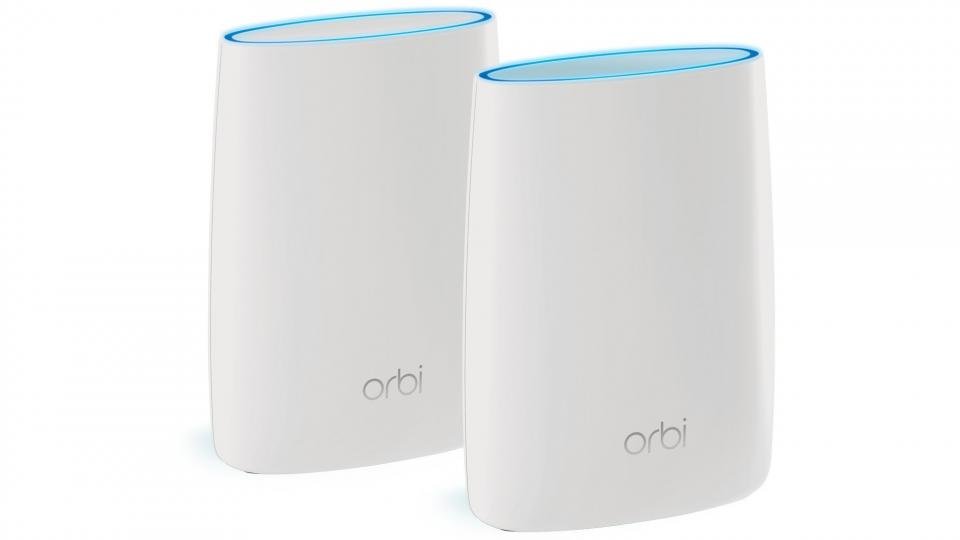
Netgear’s Orbi system comes in two sizes: the smaller RBK40 kits promise 370m² of dual-band coverage, while these larger units increase coverage to 460m², and have a faster backhaul for maximum performance. When I say they’re large, I mean it: the nodes stand a full 8in tall, but that means there’s room inside for some powerful antennae, and I got a good signal between the two nodes even when placed at opposite ends of the house.
In use, the Orbi system delivered strong Wi-Fi performance everywhere in my home, matching the Velop’s minimum of 11MB/sec – and it’s great for wired connections too, with four Gigabit Ethernet sockets per node. Netgear scores highly on the features front too, with an impressive range of management options, including the ability to set a custom IP range and a comprehensive Disney-branded parental control suite that puts other router-based controls to shame.
While the Orbi is more expensive than the Zyxel, it’s more configurable – and if you share your home with inquisitive kids, the excellent parental controls could swing the deal.
Read our full review of the Netgear Orbi
Key specs – Nodes (as reviewed): 2; Claimed coverage: 460m²; Maximum nodes supported: 4; 2.4GHz speed: 400Mbits/sec; 5GHz speed: 867Mbits/sec (client) + 1733Mbits/sec (backhaul); MIMO channels: 2×2 on client bands, 4×4 on backhaul; Ethernet ports: 3 x GbE on router, 4 x GbE on satellite; Guest network: Yes; Parental controls: Yes; Works with Alexa: Yes; IPv6: Yes; Custom IP range: Yes; Client IP reservation: Yes; Port forwarding: Yes; 2.4GHz/5GHz band splitting: Unofficial; Warranty: 1yr

NETGEAR Orbi Ultra-Performance Whole Home Mesh WiFi System (RBK50) – Router with 1 Satellite Extender, Coverage up to 4,000 sq. ft., AC3000 (Up to 3Gbps)
£289.99 Buy now 

10. Google Nest Wifi: Most user-friendly mesh system
Price: £239 (twin pack) | Buy now from Google

Google’s second-generation mesh Wi-Fi system includes remote satellites that double up as smart speakers, providing always-on access to the Google Assistant. This means you can use voice commands to do everything from playing music to controlling your smart home devices. They sound pretty decent too, producing warmer, cleaner audio than the Home Mini.
The Nest Wifi is also one of the easiest mesh systems to set up and administer: everything’s done from your phone, and there’s a simple set of guest network and parental control options on hand. We found the two-node pack was sufficient to deliver good wireless coverage throughout a medium-sized home, and if you’ve any older first-generation Google Wifi units knocking around, it’ll work with those too.
The dual-band design means that the Nest Wifi isn’t as fast as some other mesh systems, and it’s a little lacking in advanced networking features. Even so, it does everything the average household needs, and it’s a supremely convenient way to improve your coverage and upgrade your home with a bit of “OK Google” magic at the same time.
Read our full review of Google Nest Wifi
Key specs – Nodes (as reviewed): 2; Claimed coverage: 210m²; Maximum nodes supported: Not stated; 2.4GHz speed: 400Mbits/sec; 5GHz speed: 1,733Mbits/sec (combined client and backhaul); MIMO channels: 2×2 on 2.4GHz, 4×4 on 5GHz; Ethernet ports: 1 x GbE on hub; Guest network: Yes; Parental controls: Yes; Works with Alexa: No, Google Assistant; IPv6: Yes; Custom IP range: Yes; Client IP reservation: Yes; Port forwarding: Yes; 2.4GHz/5GHz band splitting: No; Warranty: 1yr
